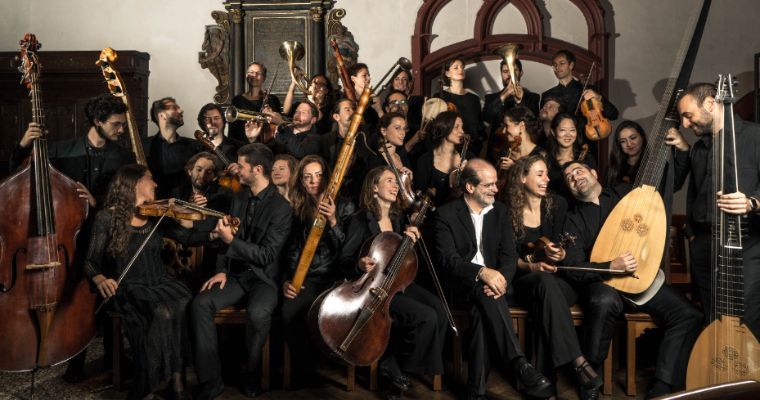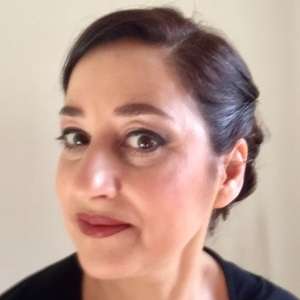“When the performance ended, the audience started roaring and whistling. It was as if we’d just given a great performance of Aida.” Kees Vlaardingerbroek, artistic director of the NTR ZaterdagMatinee series, is describing a concert performance of Vivaldi’s Orlando furioso in 2008 at the Concertgebouw in Amsterdam. It was his first project with conductor Andrea Marcon, with whom he shares a love for Vivaldi operas and a passion for digging up forgotten Baroque gems.
“I wasn’t a hundred percent sure whether the public would appreciate an opera seria by Vivaldi. I’d heard so many times from so many people that Vivaldi is a great composer for the violin, but that his operas are not that important.Orlando, the very first opera we did together, proved them all wrong.”
Vlaardingerbroek spoke to me via Zoom from his home in Hilversum in the Netherlands. Marcon joined us from his apartment in Basel, where he teaches harpsichord, organ and interpretation at the Schola Cantorum Basiliensis. Since that Orlando, they have regaled the Dutch public with such Vivaldi rarities as Catone in Utica and L’Olimpiade, but also with neglected masterpieces by other composers, including Handel’s Parnasso in festa and a Stabat Mater by Agostino Steffani.
His long-standing partnership with Vlaardingerbroek clearly works because they are completely on the same wavelength. They first met in Rotterdam, where Marcon conducted Andromeda liberata, a pasticcio assembled from arias by Vivaldi and other composers. Vlaardingerbroek was then head of programming at the De Doelen concert hall.
“Meeting Andrea was like a gift from heaven. He was making real music from Vivaldi’s scores. Finally, here was somebody who didn’t think that Vivaldi was nice but second rate, and didn't laugh at me when I said: for me Vivaldi is the Berlioz of the 18th century. His music is so full of fire and originality, but you really need somebody who can draw it out and bring it to life. Otherwise, Vivaldi just doesn’t work.”
Marcon remembers being bowled over by Vivaldi when he was 10-12 years old, at a performance of Vivaldi’s Juditha triumphans conducted by Angelo Ephrikian in Treviso. “I remember having such a strong emotional reaction to the first chorus!” In 2009 he conducted that oratorio at the ZaterdagMatinee. “Can you imagine how happy I was? You can see it on my face in the video. I look like a kid who can’t believe this is actually happening. Kees and I have done so much together, but for me Juditha will always be special.”
Vlaardingerbroek was also bitten by the Vivaldi bug early on. “When I was a young boy, you couldn’t get Vivaldi operas. I only had a recording of La fida ninfa by La Piccola Scala. Such wonderful music! I just couldn't understand why it was never performed.” When he was appointed artistic director of the ZaterdagMatinee in 2006, he knew Marcon was one of the artists he wanted to work with.
The ZaterdagMatinee series is financed by Dutch public radio and the concerts are broadcast live from the Concertgebouw on Saturday afternoons. An important remit of this unique and versatile series is to programme contemporary and lesser-known repertoire. “I wanted to do the same thing with ancient music,” says Vlaardingerbroek. “The Dutch public, and especially our audiences, are very open to embracing the unknown.”
“The worst situation for a conductor is when an artistic director dislikes what you’re performing,” adds Marcon. “Many programmers just call up an agency and say: what can you offer me? They’re not really interested and don’t even bother to show up. Kees is a real artistic director with a pure love for this repertoire. He’s involved in every detail of a project from beginning to end, just as if he were the director of a festival. In fact, his series is actually a season-long festival.”
Their latest labour of love is a revival of Merope, an opera by Geminiano Giacomelli that premiered in Venice in 1734. After a delay of a whole year because of Covid restrictions, Marcon will conduct its first modern performance in February 2022.
The detailed planning starts with selecting the score, which they discuss years ahead of the performance. For Merope there wasn’t a modern edition, so a painstaking transcription from a manuscript had to be commissioned. Casting is also a collaborative process between the conductor and the ZaterdagMatinee. Star mezzo-soprano Magdalena Kožená will sing the role of Queen Merope of Messene, whose husband and sons are murdered by the usurping tyrant Polifonte.
At the world premiere the cast included two celebrated castrato singers, the soprano Farinelli, who created the role of Epitide, and the mezzo Caffarelli. Countertenor Kangmin Justin Kim and mezzo Vasilisa Berzhanskaya will take on their roles, respectively. “Justin sang his first important role with us and now he's working everywhere,” says Marcon. Justin has this incredible tessitura and also the necessary virtuosity.”
Giacomelli enjoyed the patronage of Francesco Farnese, Duke of Parma. Between his duties for the duchy as maestro di cappella he was allowed enough time off to write around two dozen operas. There is a questionable theory that he studied with Alessandro Scarlatti, a significant figure in the then emergent Neapolitan school, which would influence Italian opera well into the 19th century. Whether this is true or not, Merope is definitely Neapolitan in flavour. So how important a composer was Giacomelli?
“For me, sometimes things are very simple,” says Vlaardingerbroek. “One of the best known Baroque arias, Sposa son disprezzata, which for many years people thought was by Vivaldi, came into being as Sposa, non mi conosci by Giacomelli. That says a lot about the quality of his work.” The aria in question is, in fact, from Merope.Vivaldi liked it so much that he borrowed it for Bajazet.
The other well-known extract from the opera is an elaborate aria that is an artistic depiction of a nightingale singing. It played a big part in Farinelli’s life after he stopped performing in public to became a chamber musician at the court of Philip V of Spain. “It seems that the king suffered from depression,” explains Marcon, “and for years, every evening Farinelli was required to sing the same few arias to him. One of them was Quell’usignolo by Giacomelli. Presumably it had an uplifting effect.”
Marcon points out that, besides gorgeous music, Merope also has the benefit of a superior libretto. “It was written around 20 years before, by Apostolo Zeno, who was the foremost Italian librettist before Metastasio came along.” Vlaardingerbroek provides an endorsement of Zeno’s stature from the great Venetian playwright and librettist Carlo Goldoni: “A manager of one of the Venetian opera houses sent Goldoni to Vivaldi’s house to revise Zeno’s libretto for Griselda. In his memoirs Goldoni writes: I had to murder Zeno’s drama.”

The Swiss period ensemble La Cetra will be performing in Merope. Marcon promises a sumptuous orchestral sound, with a rich woodwind section, trumpets, horns, timpani and theorbos, and at least two harpsichords in the continuo. Did Giacomelli specify all this in his score? More or less, but Marcon believes that, even if he hadn’t, there still would be a lot of leeway for surmising the instrumentation.
“Sometimes, the way we think about instrumentation in early music is too strict. We find a letter somewhere and conclude that a piece must be played in a certain way. But please, it was so much more pragmatic. Just because no oboes are mentioned, doesn’t mean that the composer wouldn’t have used oboes if he’d had the money to pay for them, or wouldn’t have doubled the violins, or added a bassoon. Because this was the sound of the Baroque era, not only strings. No money? Then only strings. But we know about open-air performances in Rome where hundreds of players and singers were involved!”.
The mine of forgotten Baroque operas and oratorios is seemingly inexhaustible. Just the number of operas written for the Venetian theatres alone is mind-boggling. Marcon and Vlaardingerbroek have their work cut out for them. “Venice was a bit like Broadway in those days,” says Vlaardingerbroek. “Sometimes you had as many as five or six operas running at the same time. The works we’re already familiar with are probably just the tip of the iceberg.”
He opens his copy of Taddeo Wiel’s catalogue of Venetian opera performances, I teatri musicali veneziani del settecento, published in 1897. “For the 18th century alone, Wiel lists 1274 titles. I’m afraid Andrea and I will have to keep going for at least another 200 years...”
This article was sponsored by the NTR ZaterdagMatinee


